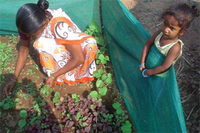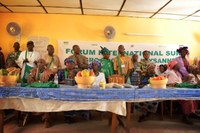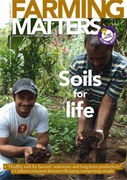Members of the AgriCultures Network are working together to advance family farming and agroecology, drawing lessons from farmers’ fields, sharing knowledge, and working with social movements for policy change. Here are some of our latest updates.
India: Kitchen gardens for improved nutrition

This is very significant considering farmers in the region are facing frequent crop failures and increased production costs. The situation is made worse because the region, suffers from acute water scarcity and degraded soils. J. Krishnan of AME Foundation tells us that, “With frequent crop failure, families and livestock are often deprived of important sources of protein. When we started our kitchen garden programme in 2010, we were hoping to improve this situation. And when we look back now and see the changes, we can say it has been a great success.”
Initially, about 400 women established kitchen gardens with 13 types of vegetable seeds. They started getting good harvests of vegetables, which were used for consumption and for selling in the local markets. This caught the attention of others, and by the end of 2014 the idea had spread from village to village to 800 families.
With increased access to vegetables on a daily basis, these families save around Rs.2100 each month and no longer need to travel to the market. To overcome water shortages, women started reusing kitchen waste water, which amounted to 40-50 litres per day. J. Krishnan: “Importantly, these kitchen gardens have become a source of strengthened families and social bonding.”
Brazil/Senegal: Agroecology for resilience in semi-arid regions
Farmers’ knowledge and agroecological experiences are cornerstones of resilience. This was the main message coming from the international seminar, Building Agroecological Resilience in Semi-arid Regions, which took place in Campina Grande in Brazil, 21-23 January, 2015. The seminar followed two days of field visits to agroecological initiatives, and attracted a few hundred farmers, researchers, activists and policy makers. The AgriCultures Network supported the seminar and network members from AS-PTA (Brazil) and IED Afrique (Senegal) attended.
Speaking at the seminar, Souleymane Cissé of IED Afrique emphasised that climate change and droughts are responsible for degradation of 67% of land in the Sahel, where 60% of the food is produced by family farmers. This impacts food security, with 16 million malnourished people in the region. However, Souleymane pointed out that “the revival of traditional agroecological practices has contributed to reversing the situation of hunger and malnutrition, and also to reducing migration of young people from rural areas to European countries.” Although agroecology is relatively unknown in Africa as compared to Brazil, he notes that it is making advances both in practice and in policy.
Paulo Petersen of AS-PTA asserted that: “Access to land must be democratised and public policies reoriented, so that the experience of family farmers who manage to successfully live with semi-arid conditions can be multiplied, broadened and consolidated.”
The outcomes of the seminar will feed into Brazil’s second National Plan for Agroecology and Organic Production and in the country’s position for the United Nations conference on desertification in Cancún.
Mali: Social movements define agroecology

At the end of the event, a declaration was drafted that states that “As smallholders, we defend our dignity when we choose to produce in an agroecological way. (…) The dialogue of our various forms of knowledge is based on respectful listening and on the collective construction of shared decisions. (…) Policy makers must respect and support our agroecological processes rather than continuing to support the forces that destroy us. We call on our fellow peoples to join us in the collective task of collectively constructing agroecology as part of our popular struggles to build a better world, a world based on mutual respect, social justice, equity, solidarity and harmony with our Mother Earth.”

